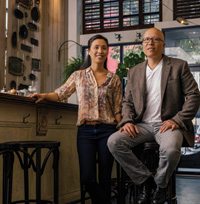This Chinatown mecca was founded in 2010 by Tannis Ling, a former bartender at Vancouver’s Chambar. Ling enjoyed the physical and creative aspects of bartending, but it wasn’t her passion, so she made a change and opened a restaurant, which allowed her to remain in the industry and town she knew. “It also allowed me to combine my love for food, Chinese food specifically, and my love for design,” adds the Bao Bei owner. “I didn’t know what the hell I was doing, so sometimes I think it’s a miracle it worked out.”
The miracle has been garnering praise from food critics and food lovers alike, since opening day in 2010. Bao Bei (which means “precious” in Mandarin) appealed to the press, who were interested in Ling’s post-bartending foray and Watanabe’s interpretation of modern Asian food. “This is one cuisine that doesn’t get messed around with very much,” explains Ling. “We give people an opportunity to taste things they would normally never [taste] unless they had a strong knowledge of Asian cuisine.”
The buzz resonates with Alexandra Gill, The Globe and Mail’s West Coast restaurant critic, who attributes the restaurant’s allure to a number of factors. “It’s a combination of things — the welcoming ambiance, the high-quality traditional Chinese foods offered in a different setting; you don’t get a big lazy Susan in the middle of your table; instead you’re served small plates that you can share with your dinner guests. They don’t dumb down flavours like a lot of modern incarnations of restaurants do,” she says.
These days, on an average night, the restaurant serves 160 people or, on busy evenings, as many as 320 guests from all demographics and walks of life. Be prepared to grab a craft cocktail at the bar and wait for 20 minutes before being seated, because no reservations are accepted.
Like most successful independents, Bao Bei is a reflection of Ling and Watanabe’s personal sensibilities that also resonate with their diners. “We’re situated in this perfect spot between casual and fine-dining, where a loud Rolling Stones song will be playing while you dig into your perfectly executed food and drink, a nice Barolo or a Piña Colada,” explains Ling. Watanabe adds: “The staff here is pretty cool; [they help] create a certain atmosphere that’s comfortable — not too rigid or over-systemized. It comes through as a casual yet funky eatery.”
The restaurant’s decor also contributes to that funky vibe. Local designer Craig Stanghetta worked with Ling to tell a visual story about his client’s Chinese ancestry, with a nod to industrial modernity. When the owner was dreaming up ways to design her future restaurant, she was living in London, England where the history and what she calls “oldness” of the place resonated with her in a big way. When she returned home, she knew she wanted to combine vintage European, almost French-looking design, with a Chinese twist. “It was also important to balance this oldness, and to some extent femininity, with modern, industrial, cleaner looking lighting,” she says. For example, the sleek space offers a wall showcasing a row of white knives by the pass window, and there are cheeky nude pin-ups in the bathrooms.
The food also comes with a twist. Watanabe, the French-Canadian and Japanese executive chef, offers a different perspective. “[My food is] authentically Chinese in some cases, and, in others, halfway between authentic and modernized versions of a dish. Some things have one foot in Chinese roots and the rest is way out there.” Take, for example, the umami-rich combination of pickled chili mustard root, roasted garlic, white pepper, soy sauce and ginger served with taro root chips that has made Bao Bei’s beef tartare ($14) a fan-favourite since the resto’s inception. “People would freak out if we took that off the menu,” says Watanabe, whose offerings share roots in Shanghainese, Taiwanese and Vietnamese cooking, with a few French flourishes.
And, the ingredients for the menu are in line with a growing consumer interest in authentic flavours. The chef sources quality free-range, hormone and chemical-free meats; organic, local produce; and he uses house-made condiments (without MSG). The downside is the difficulty in sourcing. “Right now, I’m looking for organic tomatoes, but the guy I’m talking to isn’t delivering to restaurants anymore — he’s only going to big suppliers like GFS — or he’s at farmer’s markets, so that’s got me running around a lot.” He runs to farmers markets and green grocers shops in Vancouver’s Chinatown to source his ingredients.
The community is important to the restaurant team. In fact, Bao Bei is one of the title sponsors of the Chinatown Night Market in which Ling serves as the managing director of the volunteer team organized by the Vancouver Chinatown Merchants’ Association; it’s her mandate to revitalize the formerly ho-hum affair.
The team has implemented outdoor ping-pong matches, movie nights and hip-hop karaoke as well as food trucks and vendors to liven up the neighbourhood in the evening. “[It’s] a worthwhile community project to help the night market reach its potential as a city event, which celebrates the history of Chinatown and its culture and engages the community in a more relevant way,” says Ling, who also opens a Bao Bei patio on market nights to serve curious tourists, locals and to further cement a presence on Vancouver’s culinary scene.
Remaining engaged and relevant is how Ling keeps attracting crowds of diners while honouring her Chinese heritage.
That’s not just a gift, it’s a precious commodity.





















